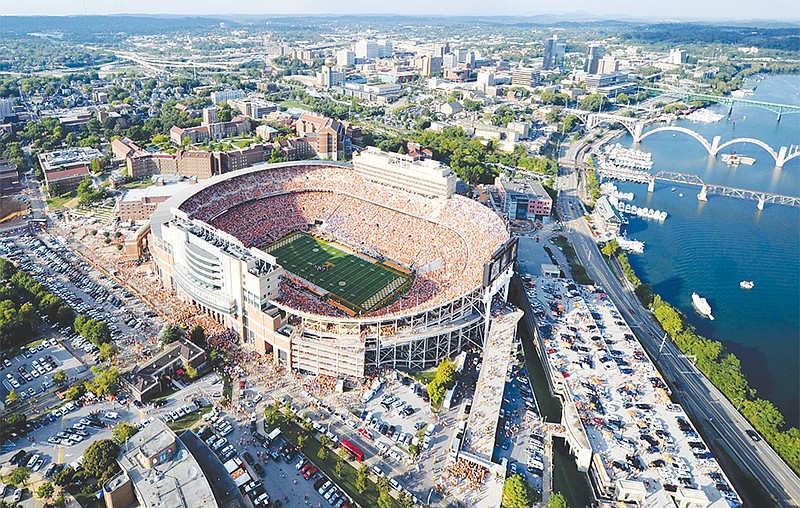KNOXVILLE - Needed changes are coming to Neyland Stadium, Tennessee's venerable football home.
Following the completion of a nine-month feasibility study, the university's board of trustees last week approved a $106 million initial phase of renovations and upgrades to the south and east sections of the Volunteers' 95-year-old stadium, and the school unveiled the visuals of its planned changes Tuesday.
The work still requires approval at the state's legislative and building commissions levels, but the university hopes to complete the first phase, which will be funded privately by donor gifts and athletic department revenue, before the start of the 2019 season.
"The generosity of our donors and our fans has been unbelievable," Chris Fuller, Tennessee's associate athletic director for external operations, said Tuesday.
Three of five renovation phases developed in 2004 were completed prior to the 2010 season for nearly $150 million, but those upgrades applied to only 35 percent of the stadium, said Brett Huebner, the associate athletic director for business operations.
"Cleary there was a long way to go and a lot to be taken care of at that point in time," he added.
Since then nine of the SEC's other 13 football programs have renovated their stadiums.
Arkansas recently received approval for $160 million to renovate its stadium. Prior to last season Kentucky completed $120 million in upgrades to Commonwealth Stadium. Texas A&M's Kyle Field was the most recent stadium to receive renovation, and Tennessee officials were wowed by it when the Vols played there two weeks ago.
"We felt it important to revise and update, take a fresh look at the stadium and develop an updated plan to renovate the remainder of the stadium," Huebner said, "and also remain competitive in the top of the SEC."
The renovation and expansion of the south concourse will include additional restrooms, improved and expanded concessions and more space for one of the stadium's high-volume areas in addition to a membership club with a field-level enclosed patio behind the end zone.
The brick wall beyond the south end zone finally will be moved back farther from the field for safety purposes. Currently the wall complies with the NCAA's minimum requirement of six feet, but the relocated wall will meet the 12-foot standard. Five end-zone sections will lose seven rows of seating.
The existing stands on the west side of the stadium's lower bowl, whose concrete infrastructure dates back to the 1920s, require intervention and improvement, and chairback seating will be added along with another field-level club.
In the upper deck handrails will be added in the aisles.
The relocation of the visiting team's locker room means opponents no longer will run out of the south end zone tunnel, but rather they will come out of an expanded entry near the goal line of the end zone, providing easier access to their sideline.
There's not yet a ballpark figure for potential cost or a timetable on approval and completion for the second and third phases of renovations.
The second phase includes more concourse renovation and expansions, needed facelifts for the entry on the south side of the stadium, the relocation of the letter winners lounge, ledge seating behind the stands in the lower bowl, a halftime meeting room and a recruiting room Tennessee promises "will have no peer."
The highlight feature of the third phase is new video boards for both the north and south ends of the stadium.
Amid all of the changes Neyland Stadium's capacity will remain higher than 100,000, though Huebner said the exact capacity won't be known until the renovations are completed.
"We believe it's part of our identity as a program," Huebner said, "that we are a part of a small amount of schools that can make that claim."
Contact Patrick Brown at pbrown@timesfreepress.com.
